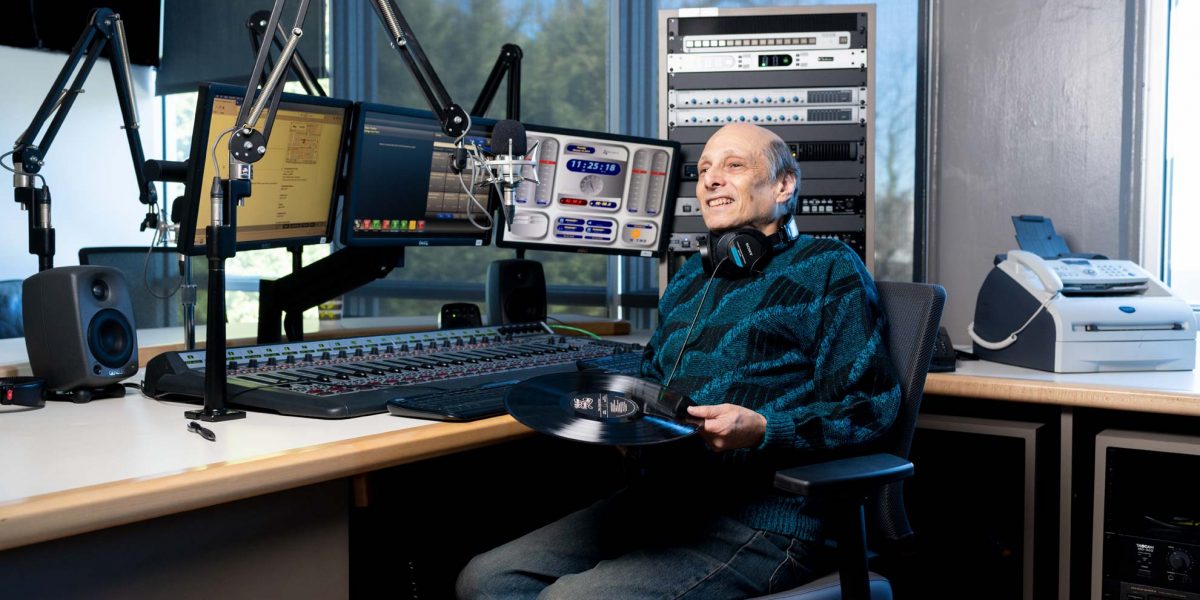Arts & Culture
Pop Goes The . . .
Prolific radio DJ Weasel is still on the air, spinning for WTMD.
The first time Mahala Morefield met Weasel, aka Jonathan Gilbert, she was a law firm receptionist posing as a music writer from the Lone Star Dispatch. It was 1975. Morefield had relocated to Washington, D.C., from Austin and stumbled across a high-pitched nasal voice spinning records on an eclectic midnight to 6 a.m. show at a 3,000-watt station with the call letters WHFS (“High-Fidelity Stereo”).
Little Feat, the Stones, Frank Zappa—a Romani-French jazz guitarist named Django Reinhardt with only eight good fingers—somehow it all fit together each night. “I had a musical crush on Weasel,” recalls Morefield. “I set up a phony 5 a.m. meeting and held on to the cassette tape of that ‘interview’ forever.”
Fast-forward almost 45 years. The WHFS days—including the later years when the station moved to Annapolis and blasted its new 50,000-watt signal toward Baltimore—are long past. The station’s epic HFStivals, of course, are gone, too. But Weasel, whose nickname was bestowed by an American University classmate who thought he resembled the creature on the cover of the Zappa-produced 1970 album Weasels Ripped My Flesh, is still on the air, spinning now for Towson University’s WTMD.
Because Gilbert doesn’t drive—he still lives in the same Bethesda building where the old WHFS studio was located and where its transmitting tower remains impaled on the roof—a revolving band of 50-plus volunteers, fondly referred to as Weasel’s Wagon Train, takes turns transporting the unlikely D.C.-Baltimore cultural icon to Towson to record his once-again, organic, free-range shows on WTMD. (Passionate, engaging, witty at the microphone, Gilbert isn’t quite a recluse off air, but he’s not on Facebook or other social media, either. “Why would I do that? I want to listen to music and I want other people to listen to music.”)
A Long Island native, Gilbert’s extraordinary curatorial gifts begin with a great natural ear, followed by a deep curiosity and impeccable memory. “It started with a transistor radio when I was 10 years old,” he says. “I’d stay up all night, covers pulled over my head, not wanting to miss a thing—sometimes that was one of the great jocks from WBAI in New York, sometimes it was a baseball game—on a good night you could get Bob Prince from Pittsburgh. I listened to Chuck Thompson from WBAL long before I came to Baltimore.”
An older brother introduced him to Chuck Berry and Little Richard. He heard the records his uncles, aunts, and parents played, their personal interests skipping from folk to jazz to Sinatra and big band. Singing in the school choir, playing clarinet through 12th grade, and graduating high school in 1967 when album-oriented rock was transforming radio, Gilbert absorbed everything.
To this day, his playlists pop with surprises and style as he juxtaposes songs in the same key and effortlessly raises and lowers the tempo. “You create a narrative, an emotional journey,” he says, thumbing through a tattered notebook during a recent set that spanned gospel, early civil rights-era, and black-power soundtracks on Martin Luther King Jr. Day. “Music is visceral first.”
In between, he provides the kind of nuggets and backstories that music lovers geek over. “When I hear something new that I like—and it could be something that’s old—I’m still that 10-year-old kid,” he says. “I want to hear it 10 times. And, like a guitar player figuring out the chords, I want to slow it down and see how they did what they did.”
By coincidence, Morefield, who moved back to Texas in the late ’70s, returned to the area shortly before Gilbert joined WTMD nine years ago. After not conversing since her “interview” when both were in their mid-20s, she’s now a friend and occasional Wagon Train driver. A whole lot and nothing has changed. “He plays your soul, your heart,” she says of his Weasel Wild Weekend shows. “A maestro of the radio. One song vibrating off the next.”
